Benoît Jacquot Farewell, My Queen Interview
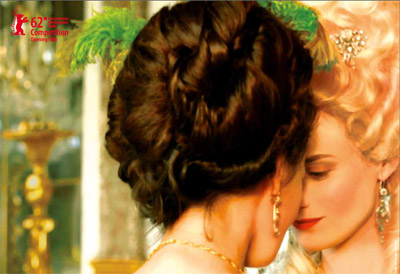
Benoît Jacquot Farewell, My Queen Interview
Cast: Léa Seydoux, Diane Kruger, Virginie LedoyenDirector: Benoît Jacquot
Genre: Drama, History
Running Time: 100 minutes
Synopsis: 1789. On the eve of the French Revolution, those living at the Court of Versailles continue to lead carefree, uninhibited lives, far from the growing unrest in Paris. When news of the assault on the Bastille reaches the court's ears, the nobles flee along with their servants, deserting the palace� But Sidonie Laborde, a young reader of the Court who is devoted to the Queen, refuses to believe the rumours. She is certain that under Marie- Antoinette's protection she will come to no harm. Little does she know that these will be the last three days she will spend at her queen's side.
Farewell, My Queen
Release Date 6th June, 2013.
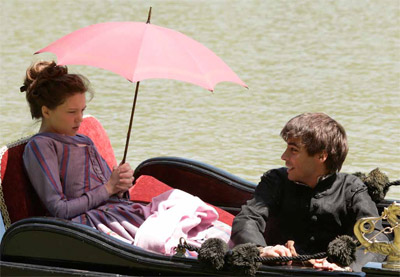
Interview with Benoît Jacquot
Question: How and when did you discover this book by Chantal Thomas?Benoît Jacquot: It was back in 2002, during a round-table discussion that we were having for "Adolphe". At the time, Antoine de Baecque was heading up the culture section at Liberation. He brought Isabelle Adjani, Chantal Thomas and myself together to discuss the problems of literary adaptations. Prior to the meeting, he gave us all a copy of Chantal Thomas's book "Farewell, My Queen" which had just won the Femina Book Award. As soon as I read it, I knew that I wanted to make it into a film.
Question: Why did you wait so long?
Benoît Jacquot: At the time, I realised that it was almost impossible to try and put together a project of this scale. "Farewell My Queen" is a historical drama set at Versailles and therefore very expensive to make. I didn't know any producers willing to put together the necessary funds for such a project. So, I dismissed it from my mind. Then, when Jean-Pierre Guerin bought the rights, he asked me to do an adaptation. I was still as keen on the project.
Question: Of the twenty films you have made, 10 of them are adaptations.
Benoît Jacquot: I am a big reader but I chose to be a filmmaker and not a writer - a conscious decision on my part. Naturally books will always play an important role in my film projects.
Question: The film tells of the fall of the monarchy, in the period between the 14th July, the day of the storming of the Bastille, and the 16th, when Louis XVI, under public pressure, was forced to sack Breteuil. The entire story is told through the eyes of a young girl, Sidonie Laborde, one of the Queen's readers at Versailles.
Benoît Jacquot: She sits at the center of the story. She is the constant presence in the film. I wanted the viewer to feel exactly what she experiences as the events unfold. I also wanted the spectator to be totally immersed in life at Versailles on her level. To have the same doubts and intimacies. Sidonie is so close to events that she is not able to understand everything that is happening around her. By definition, when you are living in the present moment, you do not have a perspective on what you are experiencing. Sharing her understanding of events with the spectator was a way to make the film as vibrant as possible, and avoid the need for any retrospection.
Question: Sidonie, the reader, played by Léa Seydoux, is much younger than the original character in the book.
Benoît Jacquot: From the outset, Gilles Taurand and I wanted the reader's point of view to be one of a very young woman, unlike the book where she is much older. We thought it was interesting as she still has a close link to childhood, and therefore the narrative of the film does not have to use flashbacks, as in the book. Chantal Thomas's narrative was robust enough for us to be able to make certain changes without altering the tone. From the moment we took that decision, adapting the book became very straightforward: all that was left to do was to leave aside certain scenes, disregard some of the characters and either shorten or condense certain passages to heighten the drama. That really is the key to this kind of project: to put aside aspects of the book in order to discover its essence.
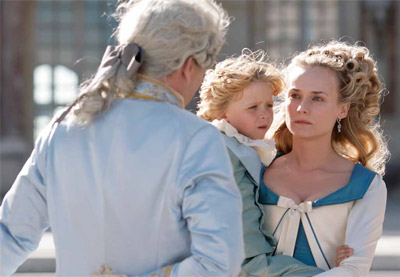 Question: In this film you have respected "unity of time". The notion of time is something you often like to play around with in your films.
Question: In this film you have respected "unity of time". The notion of time is something you often like to play around with in your films.Benoît Jacquot: I like the idea of films playing with the notion of time. For example, I find it interesting to compress time and recount a whole lifetime in an hour and a half. Or, work in real time and recount an hour and a half in an hour and a half; this is something I have already experimented with.
Question: In the four-day period that the story covers, we witness the total collapse of the nobility living at Versailles: protocol, conventions, everything collapses and everyone is looking to escape.
Benoît Jacquot: This story is a bit like the Titanic! Where a ship that is considered the most beautiful construction in the world starts taking on water and then sinking, setting off a huge wave of panic. The situation obviously creates mixed reactions: people come closer together, relationships form or, the opposite, they fall apart. Over the four days, the main characters are in a continual state of disarray. Over this short period of time, and in the same confined space (we do not leave Versailles until right at the end of the film), the characters experience different states of mind, swinging between one emotion to the next.
Question: They are cut off from the outside world and are therefore unable to get a clear picture of exactly what is going on in Paris.
Benoît Jacquot: They live shut away. But in such a vast place that we get the impression that it is a world of its own - like a country, with its own borders. In fact, those who lived at Versailles called it "that country". They are confined, which is of course ironic. In this closed world, I tried to show how information both succeeded and failed to circulate. And it's very strange: the information from the outside comes in the form of a rumour, like a foreign body invading. It starts to show in little ways, or is mentioned in passing, in people's behaviour and thoughts over these four days.
Question: Ironically, when a group of them finally leave Versailles, their world gets even smaller again.
Benoît Jacquot: Yes. They escape in a stagecoach that the camera never exits. Once outside the castle gates, it is as if they are confined yet again.
Question: Versailles is shown in a state of real filth.
Benoît Jacquot: In his "memoirs", Saint Simon brilliantly described the stench of the latrines at Versailles. A stench that came from behind the most beautiful wood panelling, gilding and chandeliers in the world. Something revolting, rotting and putrid. As if the state of the building at Versailles was a metaphor for the collapse of the regime.
Question: Sidonie, the reader, is besotted with Marie-Antoinette, who in turn is infatuated with the Duchess of Polignac. All the events that unfold are set against this troubled relationship�
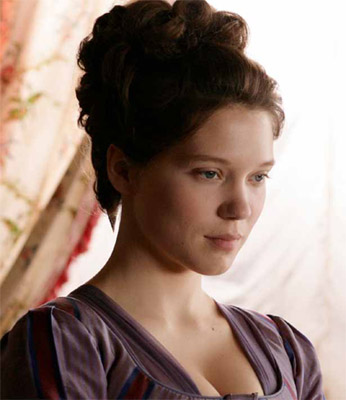 Benoît Jacquot: Sidonie is literally madly in love with the queen! I was really interested in the child-like infatuation she had for Marie-Antoinette, as well as the more "perverse" relationship between the Queen and the Duchess of Polignac. This love triangle electrifies the film.
Benoît Jacquot: Sidonie is literally madly in love with the queen! I was really interested in the child-like infatuation she had for Marie-Antoinette, as well as the more "perverse" relationship between the Queen and the Duchess of Polignac. This love triangle electrifies the film.Question: Sidonie's love is very discreet.
Benoît Jacquot: It is less obviously sexual than the relationship between the Queen and Polignac. Except the Queen herself, maintains a sexual ambiguity with Sidonie. She enthuses over her chubby arms, and rubs her to soothe a mosquito bite. Like a wild creature, Marie-Antoinette loves everything carnal. At the end of the film, when she asks Sidonie to undress so as to take Polignac's place, it is as if the love triangle is now complete. I felt it was very important, that at a certain point in the film, two of the three women should appear naked, stripped of the heavily corseted dresses they wore and that played such an important part in their everyday lives. Two out of three, but not the Queen. The Queen never shows herself, she gives the order for one of the others to instead.
Question: Léa Seydoux is exceptional in this part. She is both very physical and very modern.
Benoît Jacquot: Lea lives in jeans. I wanted her to wear the dresses of the period that were very complex to put on, in the same casual way she would wear a pair of jeans. Yet I did want her to be aware of the constraints of these dresses. I wanted her to understand XVIII Century costumery, and to live with it. Yes, she is amazing.
Question: Diane Kruger is also very remarkable as Marie-Antoinette.
Benoît Jacquot: She has the same background as Marie-Antoinette and is exactly the right age for the part. The role of Marie-Antoinette was made for her, she was the obvious choice. As an actress, she is the complete opposite of Léa. Diane is meticulous, focused, deep down she is very Anglo-Saxon, whereas Léa is more animal-like, instinctive, blowinghot and cold. Bringing the two of them together was very exciting.
Question: In the film, like in the book, we discover the lesser-known sides of Marie-Antoinette's personality
Benoît Jacquot: It is as if, in the center of the picture, the queen bee starts, for whatever reason, to upset the equilibrium and her agitation spreads throughout the hive. The accelerated events over these four days show all the different phases Marie-Antoinette went through in her life - the period of innocence, then of frivolity, then near debauchery ending with a period of great decorum. They are all mixed together. Without warning, she moves from extreme frivolity to a state of incredible lucidity, to great despondency. Like the weather. I love that. On set, when I'm giving instructions to the actors almost all my references are weather-related "Like the sun breaking through the clouds, the sun goes in, day, night." Different weather for different moods�.
Question: You film scenes relatively quickly and you have a habit of giving actors a free rein.
Benoît Jacquot: The fact that I film quickly means that I have to leave them free. The limitations of speed are such that there is only time to frame the shot, enabling us to achieve certain realism. I don't really believe in rehearsals. For "Farewell My Queen" we just booked a few days with Lea, Diane and Noemie Lvovsky who plays Madame Campan, to read the script and basically agree on what they could and could not say. This was particularly important for Diane as French is not her first language so we wanted to be sure about certain pronunciation and emphasis. I did not have to say anything to Virginie Ledoyen, I know her so well, there was no point.
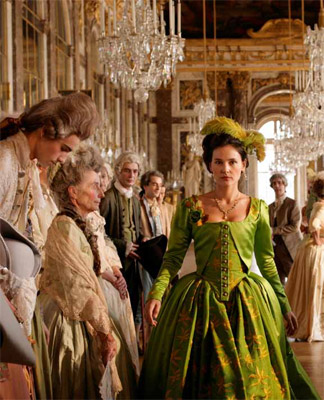 Question: There are always a lot of women in your films, and a lot of very young women.
Question: There are always a lot of women in your films, and a lot of very young women.Benoît Jacquot: I'd say it was about fifty-fifty. I have done five films with Isabelle Huppert. She was 25 when I first met her and we have worked together ever since. I love women when they just start becoming women, when they have just past the stage of being young girls. I believe this moment is special and important.
Question: Xavier Beauvois, Jacques Nolot, Marie-Julie Parmentier� also figure in the credits
Benoît Jacquot: A film's cast is essential. I do agree that, in this case, the cast is particularly distinguished. But it was vital that Léa, who is in the film right from the very first scene through to the last, be well supported. She needed to be surrounded by actors and actresses whom she admired and also who would set high standards.
Question: The lighting in "Farewell My Queen" is stunning.
Benoît Jacquot: I wanted the lighting to be both very sophisticated and very dramatic. I had already worked on another idea similar to this with Romain Winding.
Question: And the set design is incredibly sensual.
Benoît Jacquot: Each set was conceived by considering one piece of furniture at a time, after meticulous planning and plenty of discussion. Previously, on other period dramas, I arrived on location and barely changed a thing. But for this film, everything was worked out beforehand. Take the golden cabinet, for example. It is night. A fire is lit and Marie-Antoinette is burning some letters. The fire lights up everything. What could we use so that the light from the fire would contribute a nocturnal ambiance to the scene? Since this place was called the golden cabinet, Katia Wyszkop came up with the idea of making large gold screens. They add a warm, golden glow but they also add a disturbing decadence too.
Question: You did a lot of the filming at Versailles. Very few productions have ever done this.
Benoît Jacquot: We filmed there as much as we could i.e. every Monday and every night. The people running Versailles were very welcoming and made things as simple as they possibly could for us. Few films are made at Versailles because filming there costs a great deal, which puts a lot of people off. You have to be sure, which is the case in this film, that Versailles really is one of the main characters. Saying this, we did also film in other chateaux. It's actually quite funny trying to work out where each scene was shot, whether it was at the real Versailles or at one of the pretend Versailles.
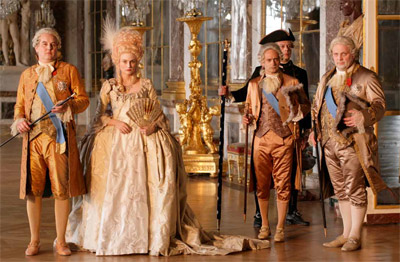 Question: How many other chateaux?
Question: How many other chateaux?Benoît Jacquot: Three mainly. The Queen's bedroom in The Petit Trianon was recreated in Maison Lafitte. It would have been impossible to film in the original room, which was too small to fit a camera. So we had to rethink it. However, the hallway and the staircase leading to her room as well as the entrance to The Petit Trianon and its immediate surroundings were all filmed at The Petit Trianon. We also filmed at the Chateau de Chantilly. This is where we shot the long galleries that the nobles can be seen walking through once they leave their own grotty apartments.
Question: "Farewell My Queen" is a big budget film, yet it feels incredibly light and modern. We have already mentioned the way Sidonie / Lea's learnt to move in her costume. But, there is also the way in which you film skin texture�
Benoît Jacquot: That's something very important for me. When I make a period drama, I always try very hard not to make it look false, like an exhibition of beautiful antiques. Of course, that staged approach can be very beautiful, there are some wonderful films - take Visconti's films for example or Kubrick's "Barry Lindon" - these are fabulous "antiques"! But that's not my thing. I want people to think this is it, this is how it is, and that's all there is to it.
Interview by Brooke Hunter
MORE
- Mission: Impossible Fallout
- Glenn Close The Wife
- Allison Chhorn Stanley's Mouth Interview
- Benicio Del Toro Sicario: Day of the Soldado
- Dame Judi Dench Tea With The Dames
- Sandra Bullock Ocean's 8
- Chris Pratt Jurassic World: Fallen Kingdom
- Claudia Sangiorgi Dalimore and Michelle Grace...
- Rachel McAdams Disobedience Interview
- Sebastián Lelio and Alessandro Nivola...
- Perri Cummings Trench Interview



